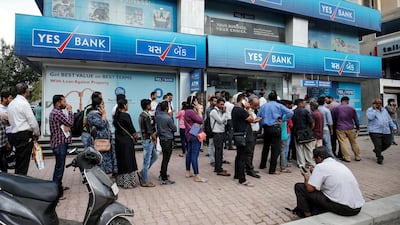Deposits at Yes Bank continued to decline this year as worried customers withdrew money from the distressed lender, which was seized earlier this month in the biggest bank rescue in the country’s history.
Deposits totaled 1.37 trillion rupees (Dh68 billion) as of March 5 – when Indian authorities took control – down 17 per cent from the start of the year, Yes Bank said in a statement on Saturday. That followed a 26 per cent year-on-year slide in the three months through to the end of December.
A lack of liquidity was cited as a key reason for the bailout. State Bank of India, ICICI Bank and HDFC are among the companies to have bought stakes in Yes Bank since it was seized.
“The bank took the opportunity of capital infusion to clean up the balance sheet as much as possible,” said Karthik Srinivasan, group head of financial sector ratings at ICRA Ratings.
Provisions climbed to 247.7bn rupees in the quarter ended December 31, from 13.36bn rupees in the previous three-month period and only 5.5bn rupees a year earlier, Yes Bank said. The bank’s gross bad-loan ratio as a share of total loans was 18.9 per cent in the December quarter, up from 2.1 per cent a year earlier.
The Mumbai-based bank swung to a net loss of 185.6bn rupees in the last three months of 2019 from a profit of 10.02bn rupees a year earlier, it said on Saturday. The lender reported a loss of 6bn rupees in the three months to September 30. Yes Bank had delayed announcing the results for about a month, saying it was busy trying to raise capital.
Yes Bank shares have plunged 46 per cent this year, even after daily gains of as much as 36 per cent last week. The stock rose 2 per cent on Friday to 25.55 rupees, although State Bank of India will only pay 10 rupees for each Yes Bank share.

